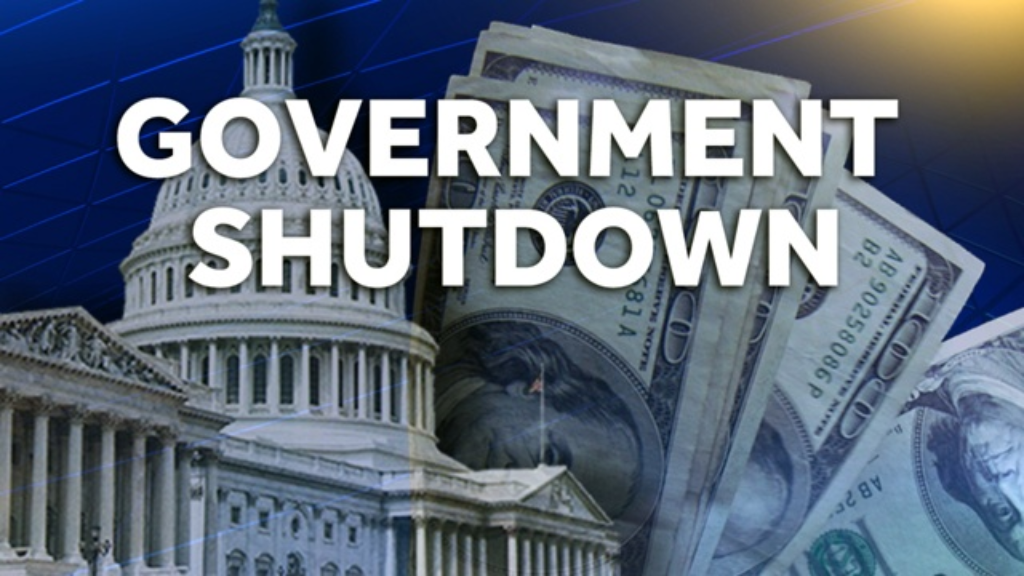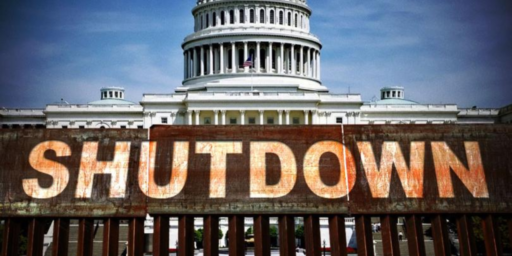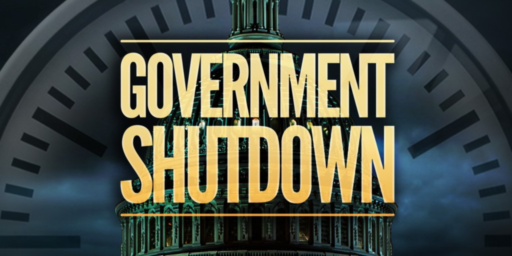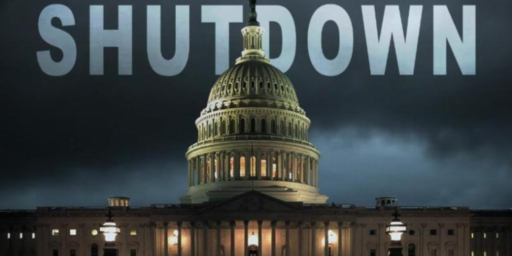No, We Can’t Withhold Congressional Pay During A Government Shutdown
While it has an admitted populist appeal. the idea of Congressional pay being withheld during a shutdown is a non-starter due to the Constitution.

Alexandria Ocasio-Cortez, the upstate Democratic Congresswoman-Elect who shocked the political establishment by defeating long-serving New York Congressman Joe Crowley back in June, argues that Congressional pay should be withheld when there are government shutdowns:
Rep.-elect Alexandria Ocasio-Cortez (D-N.Y.) on Saturday called for congressional salaries to be furloughed during the next government shutdown.
Roughly a quarter of federal agencies closed when Congress failed to meet a midnight funding deadline on Friday. Lawmakers arrived Saturday at the Capitol as congressional negotiators try to find a path forward on a deal to end the funding lapse.
“It’s completely unacceptable that members of Congress can force a government shutdown on partisan lines & then have Congressional salaries exempt from that decision,” Ocasio-Cortez wrote on Twitter.
“Have some integrity,” she added, calling for salaries to be furloughed for the next shutdown.
Salaries for both members of the House and the Senate are written into permanent law, with most members making $174,000 a year.
Government shutdowns only affect agencies and employees that are funded through annual appropriations.
Thousands of federal employees in “nonessential” government functions are told to stay home and may be prohibited from showing up to work.
Congress in the past has acted to pay those employees as part of deals to reopen the government after previous shutdowns.
Federal workers will still be paid for the pay period ending Dec. 22, the White House Office of Management and Budget has said. But if the shutdown extends past Jan. 5, they will miss their next paycheck.
This is, I’ll admit, a tempting idea. After all, it’s typically the case that these shutdowns are due to the fact that members of the House or Senate are being petulant over minor issues and the idea that they continue to get paid even while the rest of the Federal workforce is either furloughed without pay or, if they are considered an “essential” employee, forced to work without getting paid. Even if it’s just a symbolic matter, the prospect that members of the House and Senate could be forced to go without pay in the same manner as other workers seems as though it’s only fair given the fact that they actually have the power to do something about the shutdown while Federal workers are largely at the mercy of the negotiators on Capitol Hill and the White House, who are basically just posturing at this point.
Unfortunately, though, it turns out that this isn’t possible:
A federal government shutdown means that thousands of government employees — from Washington bureaucrats to park rangers — go without paychecks until the standoff in Washington resolves.
But there are 535 federal employees who still get paid: members of Congress.
Unlike other federal employees, senators and House members continue to get paid through a government shutdown. That’s because their salaries are literally written into the Constitution. Article 1, Section 6 specifies, “The Senators and Representatives shall receive a Compensation for their Services, to be ascertained by Law, and paid out of the Treasury of the United States.”
What’s more, the 27th Amendment actually prevents Congress from changing its own salaries between elections. It states that “No law varying the compensation for the services of the Senators and Representatives shall take effect, until an election of Representatives shall have intervened.”
The wording of the 27th Amendment is pretty simple, but it’s meaning is exceedingly clear:
No law, varying the compensation for the services of the Senators and Representatives, shall take effect, until an election of Representatives shall have intervened.
What this means in combination with the aforementioned provision of Article I is that, absent a law that says otherwise (and there is none), Congress will continue to get paid during a shutdown and that a law that attempted to restrict Congressional pay during a shutdown would not take effect until the next Congress takes office in January 2019. As a matter of policy, I’m not sure that such a law really matters one way or another given that the amount of money that pays Members is a relatively partial portion of the Federal Budget as a whole, but the symbolism of such a law, and the act that Congress is continuing to get paid now, is rather apparent. That’s why you see some Congressman and Senators over the past several days who have announced that they would donate their salary during a shutdown to charity, or ask that the monies be withheld during the time that the government is shut down.
There’s an obvious populist argument here, but it can easily be a distraction. We’re not in the situation that we’re in because the Constitution prevents Congressional salaries being withheld during a shutdown. Indeed, even if the 27th Amendment did not exist, or if there was a law that mandated that Congressional pay is withheld during a shutdown, it’s pretty clear that we’d be in this same situation and that the odds of it being resolved quickly would be just as long. We’re here because a minority in the House and Senate, working along with the President, have decided to use something that ought to be rather mundane like the budget process as a bludgeon to make ideological points using a strategy that, in the end, cannot possibly succeed and will likely end up damaging their own political party. I sincerely doubt that the prospect of a couple weeks without pay would change their motivations very much.
That being said, some members of Congress have directed that their pay be withheld or donated to charity during the shutdown period:
I cannot take a salary during a government shutdown knowing that so many federal workers in Nevada and across the country will go without pay. I’ll be donating my salary to a Nevada charity for every day of the Trump shutdown.
— Senator Cortez Masto (@SenCortezMasto) December 22, 2018
I submitted a letter today requesting that my pay be withheld during this partial government shutdown: pic.twitter.com/9glqRgmlCG
— Rep. Elise Stefanik (@RepStefanik) December 22, 2018
It’s also worth noting that this shutdown is unlikely to impact the salaries of Congressional and Senate staffers or the support personnel that work for Congress and must be at work when Congress is in session, or in the case of the Capitol police even when it is out of session, whether they are paid or not. This is because Legislative Branch operations are not impacted by this shutdown since that is one of the Appropriations Bills that Congress passed prior to the end of the Fiscal Year in September. Congressional operations therefore continue as usual.






They can’t withhold pay but Senators and Congressment can be made to receive their pay in a most public and shameful way.
How about cutting them a paper check that they must pick up in person on the steps of the Treasury at high noon and with the newspapers and public invited to attend?
I suspect this is one Constitutional amendment that a whole lot of people from both sides could get behind.
IIRC those working w/out pay will get paid for the shutdown period when it’s lifted. Not clear to me that doing the same to Congress critters would be a violation. And apparently the 2019 Congress can do it to the 2021 congress. And it’s hard to see how Congress can be held essential, at least short term.
However, except for AOC herself and a few others, they’re all millionaires, with little of their income coming in their congressional paychecks. A months delay, or even losing a month, would mean little to most of them. Which wouldn’t keep McConnell or any of the rest from bragging about their suffering. And it wouldn’t hurt billionaire Trump. On second thought, Trump it might hurt.
@gVOR08:
According to the Office of Management and Budget, the most recent pay period for all Federal workers ended prior to the shutdown so that means they will get their paychecks that were supposed to be sent on December 28th regardless of whether or not the shutdown is still in effect. This applies whether or not these people are covered by the shutdown (3/4 of Federal workers are not impacted by the shutdown at all) or not and regardless of whether they are considered “essential” or “non-essential” employees.
The problem for workers will be for the pay period that begins today, for which Federal workers are set to be paid on January 11th. If the shutdown is still in effect then, then paychecks for affected workers will not go out. Additionally, for workers who are affected by the shutdown Congress will need to make a special appropriation to allow them to be paid for the period of the shutdown. Typically, this is a provision that is covered either in the final deal that resolves a shutdown or by subsequent legislation
@Scott:
I like the way you think.
I posted about this in another thread. I didn’t expect it to get one of its own.
The Romans had a magistrate, the Aedile, who was responsible for the maintenance of public buildings, as well as throwing the various festivals the city held every year, using their own money to do so. This office demonstrated a man’s earnestness to perform public service (I’ll say). Usually there were four Aediles (Aedilae?) at once.
There should be such an office in the US, to pay the salaries of all federal workers furloughed or otherwise not receiving payment from the nation’s coffers during a shutdown. Of course, they’d use their own money to pay these salaries.
To spread the liability, there should be a dozen or so chosen by lot, except the president (or in this case Trump), Majority Leader of the Senate, and Speaker of the House must always serve.
Add that they won’t ever be reimbursed, and they cannot take donations to pay the salaries. If they lack the means, they can borrow money from the US Treasury, at double the going interest rates on Treasury bonds.
Oh, the Roman Aedile office was voluntary. one had to be elected to it, and it wasn’t necessary for climbing the rungs of power towards the Consulship and near-inevitable (and lucrative) Proconsulship. Surprisingly many people ran for it.
@Scott:
How about daily payments, in pennies?
Though seeing these are politicians, perhaps an hourly payment would be more appropriate.
@Kathy: Thanks for the history lesson. My knowledge of Roman history and government was just what I picked up in three years of Latin, and reading the first chunk of the Aeneid every few years before deciding this is not the year (compared to the Odyssey and the Iliad, it doesn’t grab me). Always a weird little nugget of information.
I’m just going to assume Adele named herself after the Aedile.
If the treasury just stiffed the congress on their paychecks, I’m pretty sure none of them would have the gall the sue for it…
I don’t think it’s a great idea, as it will only really effect a few congresscritters in any meaningful way, but it’s entirely doable. And, Donald Trump enjoys not paying bills.
With all of congress home for Christmas, and nothing happening in Washington, I wonder why they can’t work and vote from home? We have the technology, and it would really make their holidays miserable.
Open hearings, votes, lots of stuff can and should be done in public.
The Constitution can always be amended – it was designed to be so. If the shutdown mechanic is going to be a reoccurring or standing feature in our political lives then there is absolutely no reason for citizens to not push for an amendment to make Congress-critters suffer the same as regular workers do (or worse). A major reason they feel comfortable screwing over federal workers and voters in general is that it’s not going to hurt them in any meaningful way. It’s really funny how people sudden get less stubborn when it’s their own wallet on the line….
@Gustopher:
You’re welcome.
“The past is a foreign country. They do things differently there.” L. P. Hartly
What’s eerie is that at times the ancients act and talk almost like us moderns, then they go and do some truly bizarre things.
@Kathy @ Scott:
Combine the ideas – they can pick up a small portion representative by a voucher at separate locations around town. One must pick up every voucher in person every day by a specific time or the whole pay period is forfeit (or next one’s, depending on the pay schedule). Even a minute late is defaulted. Proper ID must be presented and paperwork signed. You can’t send minions claiming you’re busy “negotiating” – after all, if regular folk can run around town and wait in line plus put work hours in, so can you! Also, no government cars can be used to get you there because it’s a waste of non-essential items in a shutdown.
Malicious compliance can be ever so much fun for an evil bureaucratic mind….
“until the next Congress takes office in January 2015.” Where are the copy editors of yesteryear?
Let Mexico pay them.
BTW, Merry Christmas all.
No no no, you need to hit the Congressbeings where it hurts. Forget their paychecks — furlough their staffs. No Congressional staffers get paid until the government is fully funded. Better yet, staffers are forbidden to actually work during a government shutdown. (This is already true of most “non-essential” feds. Agency Inspectors General can get really pissy about it.)
@Kathy:
That sounds very much a future quote from a political scientist from the city of New Venice (formerly known is “Miami”) in trying to understand the former American Culture. The average contemporary is at a loss to understand the behavior of people in the early 21st century.
@Kathy:
http://www.nytimes.com/2018/12/24/review/Edward-j-watts-mortal-republic.html
(the link might not actually LINK – auto correct insisted on capital E. You know what to do. You’ll enjoy the review and if you order the book, it will have sold two copies this morning.)
And Merry Christmas to all
@JohnMcC:
Thanks. I found it. I put the audiobook on my queue. It will be interesting to compare it to Mike Duncan’s “The Storm Before the Storm” about the same subject.
@Liberal Capitalist:
There was a Simpsons marathon yesterday for some reason. I caught an ep where Homer takes heat from Bart and Lisa about the music he listens to, mostly bands from the 70s and 80s. These are compared with modern bands of… 1996, when the episode aired. I wonder how many of those bands are still around, or are thought of as cool by today’s youth.